Academics
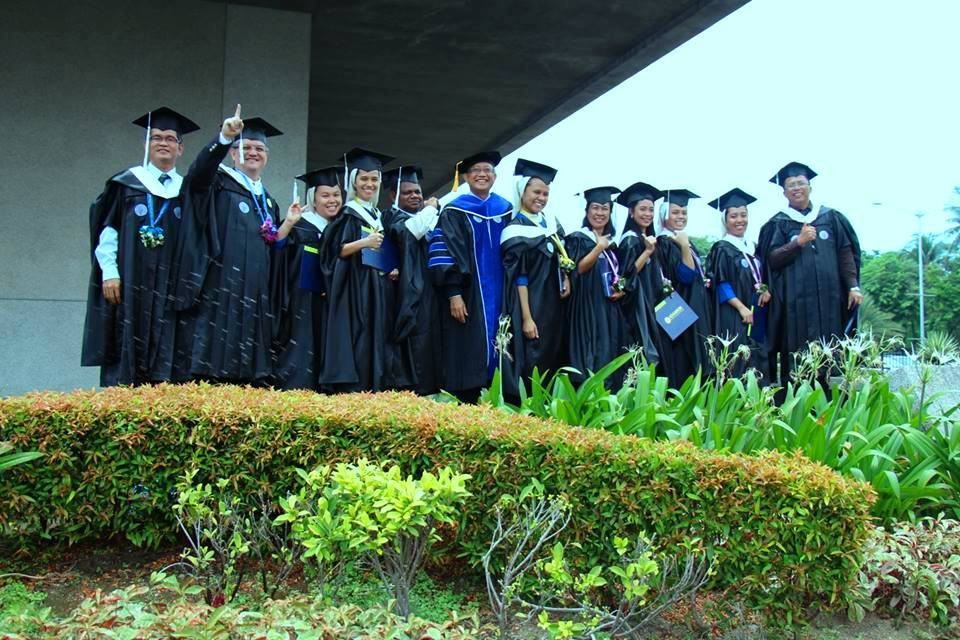
St. Vincent School of Theology is the Graduate School of Theology of Adamson University (AdU). In the spirit of “doing theology from the margins”, it offers different courses which can help us achieve its goals. The courses are structured and taught in an interdisciplinary manner. They are open to both local and international contexts as well and to the contemporary developments in the philosophical-theological sciences and other disciplines. Our professors carefully seek some balance between academic content and practical-pastoral orientation, between tested classical approaches and more relevant contemporary methodologies. SVST is also continuously undergoing accreditation processes with reliable accrediting bodies and networks with other prestigious institutions of learning.
We offer the following degree courses: “Doctor of Philosophy in Theology’ (Ph.D. in Theology), “Master of Arts in Theology” (MA Theology), “Masters in Pastoral Ministry” (MPM) and “Bachelor of Arts in Philosophy” (AB Philosophy). The diploma non-degree courses are “Philosophy for Theological Studies” (PTS), Introductory Theological Formation (ITF) and “Christian Theology for the Laity” (Hapág-Layko Program).
Doctor of Philosophy in Theology
The Doctor of Philosophy in Theology Program is aimed at forming contextual professional theologians who are capable of doing solid and sustained theological reflection, teaching, academic research and pastoral praxis in their own contexts.
Academic Prerequisites
A student must have graduated from Masters in theology with academic degree (Thesis Program) as specified by the Commission on Higher Education in the Philippines or its equivalent in other countries.
Those who have graduated from other non-thesis programs of Masteral courses other than theology shall have their credentials evaluated by the Dean or Director of Admissions.
Academic Course Load
Basic Courses 06 Units
Core Philosophy 09 Units
Areas of Concentration 27 Units
Foreign Languages 06 Units
Comprehensive Examination
At the end of one’s course work, the student shall take an oral comprehensive examination.
Public Defense
Curriculum
A. Basic Courses (6 units)
Methods in Theological Research
Advanced Scientific Research Methods
B. Core Philosophy Courses (9 units)
[Any three of the following subjects:]
Contemporary Philosophies of the Human Person
Contemporary Ethical Theories
Contemporary Researches on Ancient Philosophies
Contemporary Researches on Medieval Philosophies
Contemporary Researches on Modern Philosophies
Advanced Metaphysics
Contemporary Critical Theories
Contemporary Philosophy of Nature
Phenomenological Method
Advanced Hermeneutic Studies
Contemporary Philosophies of Religion
Asian Philosophies
Filipino Philosophy
Contemporary Philosophies of Science
Structuralism, Post-structuralism and After
Feminist Philosophies
Intercultural Philosophies
C. Major Courses (27 units)
*Concentration on Systematic Theology (any seven of the following subjects)
Patristics
Medieval Theologies and Theologians
Modern Theologies and Theologians
Contemporary Theologians
History of Theological Methods
Contemporary Theological Methods
Recent Documents of the Church
Asian Religions and Theologies
Language, Symbols and Theology
Contemporary Christologies
Contemporary Developments in Ecclesiology
Eschatology in Contemporary Perspectives
Studies in Indigenous and Popular Religions
Contemporary Developments in Ecumenism
Contemporary Developments in Interreligious Dialogue
Theologies of Creation
Spiritual Theology: History and Prospects
Spiritual Traditions: East and West
Contemporary Theologies of Liberation
Inculturation: History and Prospects
FABC and PCP II: Theological Directions
Filipino Theologies: History and Prospects
Theologies of the Sacraments
Theology of the Eucharist: History and Celebration
Liturgical Inculturation
*Concentration on Moral Theology (any seven of the following subjects)
Methods in Moral Theology: History and Prospects
Catholic Social Tradition: Contemporary Developments
Christian Sexual Morality: Contemporary Developments
Life, Death and Dying: Ethical Reflections
Medical Ethics
Contemporary Issues in Moral Theology
Social Analysis: Theological and Pastoral Perspectives
Migration: Theological and Ethical Perspectives
Magisterium and Moral Theology
Virtue Ethics
Contemporary Approaches to Ecotheology
D. Foreign Languages (6 units)
[Any two of the following subjects]
Latin
Biblical Greek
Hebrew
French
German
E. Dissertation (12 units)
Seminar in Dissertation Writing
Dissertation Writing
Master of Arts in Theology
This academic degree is a master's thesis program aimed at preparing individuals involved in the practice of theological education to have a basic comprehensive and critical grasp of the Scriptures and the Christian tradition in the context contemporary global issues and developments. The different major concentrations are made available to allow for basic specialization in some central theological fields.
Areas of Concentration (Majors)
a. Systematic Studies
b. Moral Studies
c. Biblical Studies
d. Liturgical Studies
e. Vincentian Studies
Academic Prerequisites
a. An applicant must have graduated in any Bachelor’s Degree (four- year university course) as specified by the Commission on Higher Education in the Philippines or its equivalent in other countries.
b. The student shall have taken up at least 12 units of theology or philosophy in his/her undergraduate courses from previous university or equivalent institutes of learning.
Academic Course Load
Basic Courses 6 Units
Core Courses 12 Units
Major Courses 18 Units
Elective/Practicum 12 Units
Thesis Writing and Defense 6 Units
Comprehensive Examination
Students shall take an oral comprehensive examination in front of a panel of three (3) members representing three theological fields: one’s field of concentration (Major) and 2 other fields to be determined by the Graduate Studies Director depending on the majority of courses taken.
Public Defense
Curriculum:
Master of Arts in Theology Major in Systematic Studies
(Thesis Program/ Academic Degree)
Master of Arts in Theology Major in Moral Studies
(Thesis Program/ Academic Degree)
Master of Arts in Theology Major in Biblical Studies
(Thesis Program/ Academic Degree)
Master of Arts in Theology Major in Liturgical Studies
(Thesis Program/ Academic Degree)
Master of Arts in Theology Major in Vincentian Studies
(Thesis Program/ Academic Degree)
Curriculum
A. Basic Courses (6 units)
Research Methods 1
Research Methods 2
B. Core Courses Fundamentals (12 units)
Introduction to Scriptures
Fundamental Systematic Theology
Fundamental Moral Theology
Theology and Cultures
Vincentian Studies
C. Major Courses (18 units)
Christology
Ecclesiology
Triune God
Creation and Eschatology
Theological Anthropology
Theologies of Liberation
D. Elective/Practicum (12 units)
Seminar 1
Seminar 2
Elective 1
Elective 2
E. End Course Requirement (6 units)
Thesis Writing/ Thesis Defense
Curriculum
A. Basic Courses (6 units)
Research Methods 1
Research Methods 2
B. Core Courses Fundamentals (12 units)
Introduction to Scriptures
Fundamental Systematic Theology
Fundamental Moral Theology
Theology and Cultures
C. Major Courses (18 units)
Christian Sexual Morality
Life and Biomedical Ethics
Catholic Social Tradition
Special Moral Questions
Contemporary Issues in Moral Theo 1
Contemporary Issues in Moral Theo 2
D. Elective/Practicum (12 units)
Seminar 1
Seminar 2
Elective 1
Elective 2
E. End Course Requirement (6 units)
Thesis Writing/ Thesis Defense
Curriculum
A. Basic Courses (6 units)
Research Methods 1
Research Methods 2
B. Core Courses Fundamentals (12 units)
Introduction to Scriptures
Fundamental Systematic Theology
Fundamental Moral Theology
Biblical Hebrew and Greek
C. Major Courses (18 units)
Pentateuch
Historical and Prophetic Writings
Wisdom Literature
Synoptics and Acts
Johannine Writings
Pauline and Catholic Epistles
D. Elective/Practicum (12 units)
Seminar 1
Seminar 2
Elective 1
Elective 2
E. End Course Requirement (6 units)
Thesis Writing/ Thesis Defense
Curriculum
A. Basic Courses (6 units)
Research Methods 1
Research Methods 2
B. Core Courses Fundamentals (12 units)
Introduction to Scriptures
Fundamental Systematic Theology
Fundamental Moral Theology
Fundamental Sacramentology
C. Major Courses (18 units)
Sacraments of Initiation
Sacraments of Healing
Sacraments of Vocation
Liturgical Year and Divine Office
Inculturation of Sacraments & Liturgy
Contemporary Issues in Liturgical Studies
D. Elective/Practicum (12 units)
Seminar 1
Seminar 2
Elective 1
Elective 2
E. End Course Requirement (6 units)
Thesis Writing/ Thesis Defense
Curriculum
A. Basic Courses (6 units)
Research Methods 1
Research Methods 2
B. Core Courses Fundamentals (12 units)
Introduction to Scriptures
Fundamental Systematic Theology
Fundamental Moral Theology
Theology and Cultures
C. Major Courses (18 units)
Christology
Ecclesiology
History of the Vincentian Family
St. Vincent de Paul
Vincentian Spirituality
St. Louise and the Vincentian Saints
D. Elective/Practicum (12 units)
Vincentian Popular Missions
Seminar
Elective 1
Elective 2
E. End Course Requirement (6 units)
Thesis Writing/ Thesis Defense
Masters in Pastoral Ministry
This Professional degree is a non-thesis Masters’ program aimed to equip individuals involved in different pastoral ministries with appropriate and critical grasp of basic theological frameworks and effective pastoral skills necessary to do ministry in their own pastoral contexts.
Academic Prerequisites
a. An applicant must have graduated in any Bachelor’s Degree (four-year university course) as specified by the Commission on Higher Education in the Philippines or its equivalent in other countries.
b. The student shall have taken up at least 12 units of theology or philosophy in his/her undergraduate courses from previous university or equivalent institutes of learning.
Academic Course Load
Core Courses 15 Units
Major Courses 18 Units
Elective/Practicum 12 Units
Comprehensive Examination
a. At the end of one’s academic course work, the student shall take an oral comprehensive examination in front of a panel of three (3) members representing three theological fields: pastoral ministry and 2 others to be determined by the Graduate Studies Director depending on the majority of courses taken.
b. After having passed the comprehensives, the student shall apply for graduation in Adamson University and shall be proclaimed graduate in Masters in Pastoral Ministry.
Curriculum
A. Core Courses Fundamentals (15 units)
Introduction to Scriptures
Fundamental Systematic Theology
Fundamental Moral Theology
Theology and Cultures
Christology
B. Major Courses (18 units)
Ecclesiology
Pastoral Theology 1
Pastoral Theology 2
Theology of Mission
Ministries in the Church
Poverty and Development Studies
C. Elective/Practicum (12 units)
Seminar 1
Seminar 2
Elective 1
Elective 2
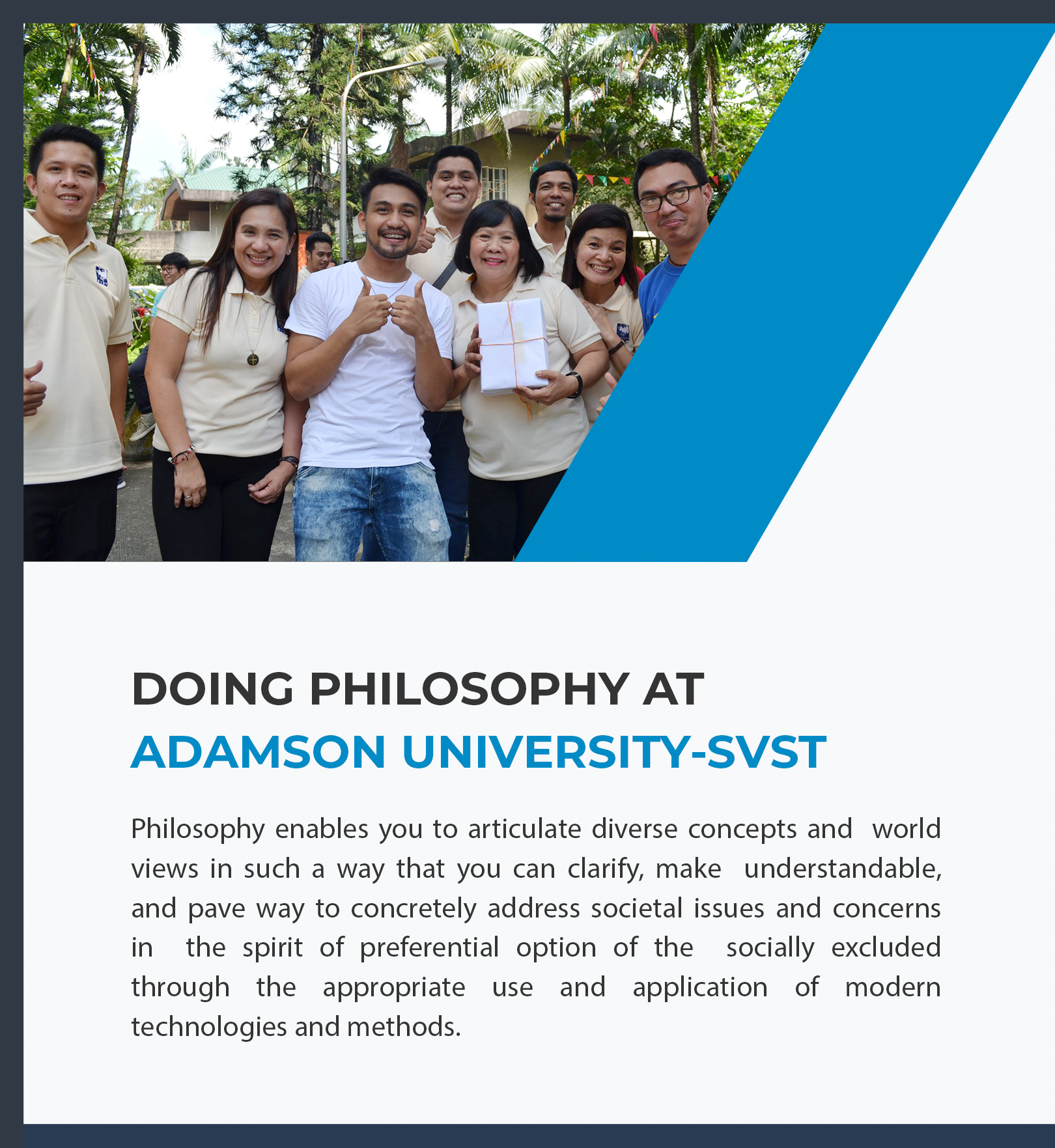
Bachelor of Arts in Philosophy
This is a 4-year college degree program offered at Adamson University under the college of Liberal Arts. This course is offered to provide special training for students who wish to major in Philosophy or as preparation for a professional advanced program in Law, Theology and Graduate Studies in Human Sciences.
Academic Prerequisites
1. An Applicant must be a high school graduate.
2. He or she should have taken and passed the Adamson University Entrance Exam (UEE). For more details, please click here to visit the Adamson UEE Requirements page.
Academic Course Load
Minor Courses
First Year
First Semester 23 Units
Second Semester 23 Units
Second Year
First Semester 23 Units
Second Semester 23 Units
Major Courses
Third Year
First Semester 24 Units
Second Semester 21 Units
Fourth Year
First Semester 18 Units
Second Semester 9 Units
Students shall take all of their first and second year minor subjects at Adamson University. Major subjects are taken on their third and fourth year at St. Vincent School of Theology.
End Course Requirement
At the end of one's academic course work, students shall pass their approved and graded thesis.
B. A. in Philosophy Curriculum 2023
(Effective 1st Semester, School Year 2023-'24)
FIRST YEAR
First Semester
INTRODUCTION TO PHILOSOPHY
LOGIC
HISTORY OF WESTERN PHILOSOPHY 1 (ANCIENT AND MEDIEVAL)
AND MEDIEVAL PHILOSOPHY
PURPOSIVE COMMUNICATION
UNDERSTANDING THE SELF
PATHFIT 1- MOVEMENT COMPETENCY TRAINING
NATIONAL SERVICE TRAINING PROGRAM 1
SEARCHING FOR GOD IN THE WORLD TODAY
Second Semester
SEMINAR ON PLATO/ARISTOTLE
SCIENCE, TECHNOLOGY AND SOCIETY
MATHEMATICS IN THE MODERN WORLD
THE CONTEMPORARY WORLD
ADVANCED PHILOSOPHY OF HUMAN PERSON
PATHFIT 2- EXERCISE-BASED FITNESS ACTIVITIES
NATIONAL SERVICE TRAINING PROGRAM 2
RESPONDING TO GOD’S CALL BY BECOMING FULLY HUMAN
SECOND YEAR
First Semester
METAPHYSICS
READINGS IN PHILIPPINE HISTORY
HISTORY OF WESTERN PHILOSOPHY 2 (MODERN AND CONTEMPORARY)
GE ELECTIVE 1
FOREIGN LANGUAGE 1
PATHFIT 3 - DANCE
CELEBRATING GOD’S PRESENCE AS A CHRISTIAN COMMUNITY
HISTORY OF INDIAN PHILOSOPHY
Second Semester
EPISTEMOLOGY
ETHICS
COSMOLOGY (PHILOSOPHY OF NATURE)
FOREIGN LANGUAGE 2
HISTORY OF CHINESE PHILOSOPHY
GE ELECTIVE 2
PATHFIT 4 - SPORTS
TRANSFORMING THE WORLD WITH ST. VINCENT
THIRD YEAR
First Semester
MODERN ASIAN THOUGHTS
PHENOMENOLOGY
PHILOSOPHY OF RELIGION
ART APPRECIATION
ALLIED ELECTIVE 1
GE ELECTIVE 3
HERMENEUTICS
FREE ELECTIVE 1
Second Semester
COMPARATIVE PHILOSOPHY (EAST-WEST)
POLITICAL PHILOSOPHY (SOCIAL CRITICAL THEORY)
PHILOSOPHY OF SCIENCE
AESTHETICS
ALLIED ELECTIVE 2
THESIS 1
SEMINAR ON FILIPINO PHILOSOPHY
FOURTH YEAR
First Semester
SEMINAR ON CONTEMPORARY PHILOSOPHY
PHILOSOPHY OF LANGUAGE
ALLIED ELECTIVE 3
PHILOSOPHY OF EDUCATION
FREE ELECTIVE 2
LIFE AND WORKS OF RIZAL
Second Semester
SPECIAL QUESTIONS IN PHILOSOPHY
SPECIAL QUESTIONS IN ETHICS
THESIS WRITING 2
~~~~~~~~~~~~~~~~~~~~~~~~~~~~~~~~~~~
Disciplinal/Allied Electives (9 Units)
Religious Studies Track
Allied Elective 1 – Introduction to Philosophical Theology
Allied Elective 2 – Christian Philosophy
Allied Elective 3 – Values Education (Axiology)
Social Sciences Track
Allied Elective 1 – Human Growth, Learning, and Development
Allied Elective 2 – Educational Sociology
Allied Elective 3 - Observation and Community Immersion
GE Electives (9 Units)
Environmental Science
Human Reproduction and Society
Philippine Indigenous Communities
Religions, Religious Experiences and Spirituality
Gender and Society
Great Books and Literature
Free Electives (6 Units)
Conceptions of Anthropological Development
Conflict Management and Peace Studies
Filipino Psychology
Fundamentals of Political Science
Principles of Guidance and Counselling
Principles of Teaching
Process Philosophy and Theology
Religious Thought in the Jewish and Islamic Traditions
Research and Evaluation
Theories of Personality
Foreign Language 1 & 2
Latin 1 & 2
Greek 1 & 2
Spanish 1 & 2
German 1 & 2
Italian 1 & 2
French 1 & 2
SCHOLARSHIP AVAILABLE: https://www.svst.edu.ph/admissions#enrolling1
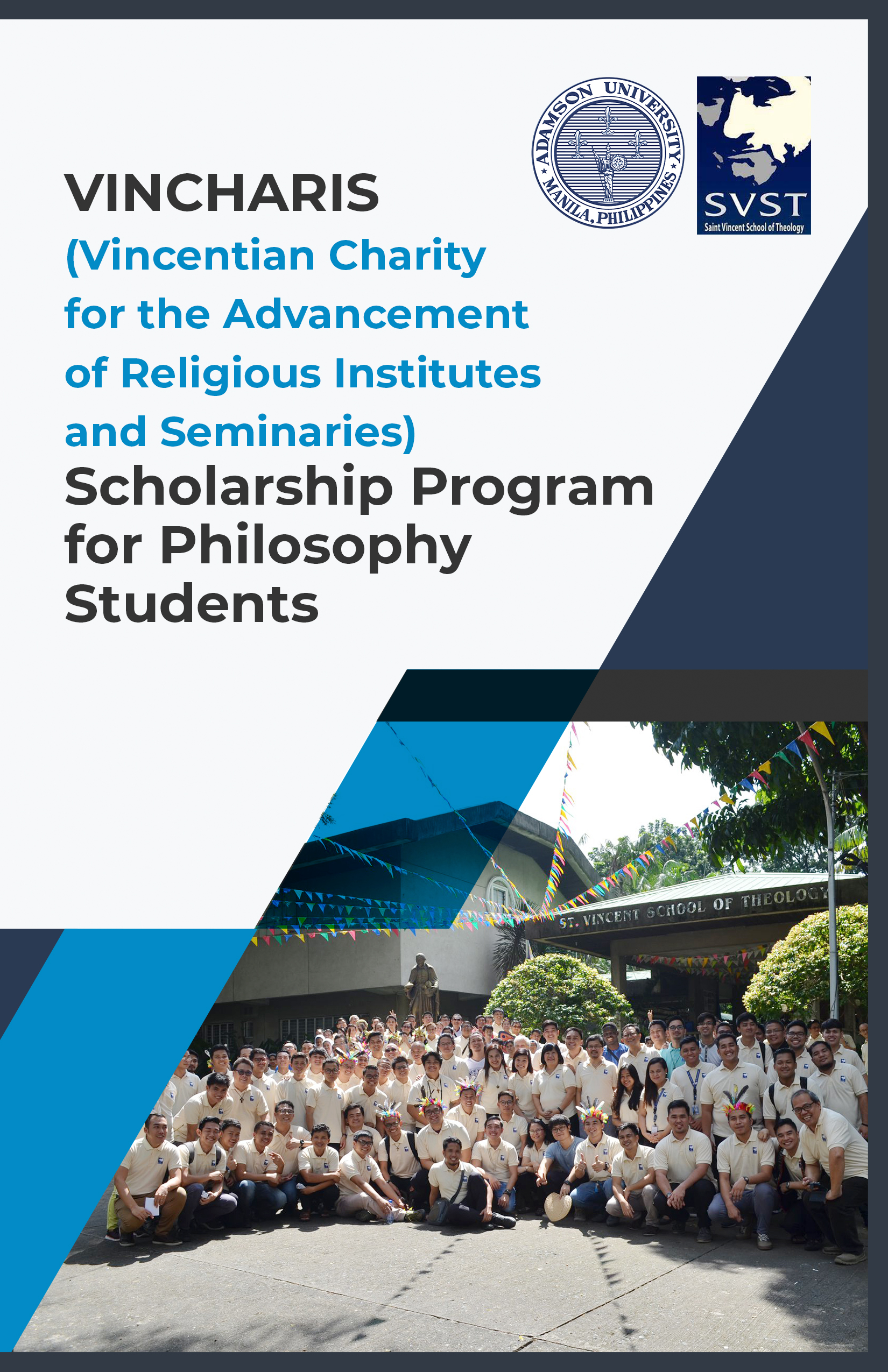
Bachelor in Theology and Religious Studies
Cooperation Agreement between Katholieke Universiteit Leuven (KU Leuven) and St. Vincent School of Theology – Adamson University
The Universities have agreed as follows:
1. Purpose of the Agreement
The mutual purpose of this Agreement is to stimulate cooperation with regard to the theological and pastoral formation of persons for effective service to the Church and society between the Faculty of Theology and Religious Studies (Katholieke Universiteit Leuven) and the St. Vincent School of Theology (SVST), Adamson University.
2. Fields of Cooperation
2.1. Both universities agree to intensify an educational and scholarly cooperation through common projects in teaching and research in all areas of mutual interest with a focus on fostering a way of doing theology that builds on the religious experience and praxis of the socially excluded (“Doing Theology from the Margins of Asia”).
2.2. The universities will define and plan projects specified in article 2.3 of this cooperation agreement (hereafter called “Projects") which fulfill several conditions: (1) they must be in accordance with their mutual or complementary strengths; (2) they meet the strategic options of both partners with regard to research, education or other forms of institutional cooperation (e.g. Policy Plan FTRS 2014-2020, SVST Vision 2013-2023); and (3) they do not exceed the limits of the financial means each of the partners has allocated.
2.3. Both universities agree to, and shall endeavor the general cooperation through the following activities:
a) The organization of two joint curricula: a joint Bachelor of Theology and Religious Studies and a joint Doctoral Programme in Theology and a joint Doctoral Diploma called Doctor’s Degree in Theology/Doctor of Philosophy in Theology (Ph.D. in Theology);
b) The organization of an affiliation of SVST to the Faculty of Theology and Religious Studies with regard to the Canonical degree of Sacrae Theologiae Baccalaureus (STB);
c) The exchange of academic staff, for a short period of time;
d) The organization of joint research activities/projects, which may be supported by the exchange of scientists and scholars;
e) The exchange of students preparing for their doctoral degree and postdoctoral researchers, for a short period of time (to be specified in the appendix), provided they collaborate in joint projects and live up to the international standards of this agreement;
f) The organization of joint courses;
g) The organization of joint conferences, seminars, workshops, symposia, etc.
h) The exchange of publications and material for scientific, scholarly, educational and information purposes, also by means of access for SVST to the FTRS internet possibilities and bibliographical resources.
2.4. Whenever possible, the exchange of doctoral students, postdoctoral researchers and academic staff will be arranged through participation in European or international programmes, as well as in innovative projects that may promote also other manners of cooperation than those mentioned in 2.3.
2.5. The actual arrangements regarding the mutually designated fields of cooperation will be specified in four appendices to this agreement which are integral part of this cooperation agreement.
Click the link below to know more about KU Leuven- Faculty of Theology and Religious Studies

To know more about KU Leuven, please follow the link below:
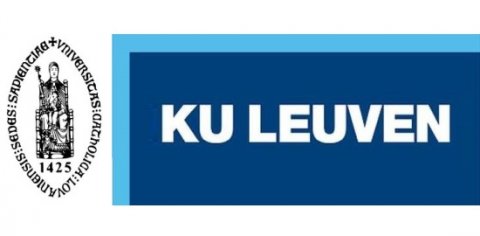
KU Leuven is an institution for research and education with international appeal. Ranks among the best 50 universities worldwide!
Click the links above to follow.
Curriculum for the Ordained Ministry
This non-civil degree program is a four-year theological and pastoral training aimed at preparing seminarians for their future priestly ministry. This academic theological formation is intended to fulfill the canonical requirements for the formation of priests and is patterned after the Ratio Formationis for Theological Education in the Philippines. A candidate for the priesthood can also take up the Masters Program in Theology while pursuing the Curriculum for the Ordained Ministry.
Academic Pre-requisites
a. An applicant must have graduated in any Bachelor’s Degree (four-year university course) as specified by the Commission on Higher Education in the Philippines or its equivalent in other countries.
b. The student shall have taken up at least 15 units of theology and at least 30 units of philosophy in his/her undergraduate courses from previous university or equivalent institutes of learning.
Academic Course Load
Students shall finish within a specified time the academic course load of a total of one hundred fifty six (156) Units of theology as specified in the Curriculum for the Ordained Ministry program.
Synthesis Paper Defense
After fulfilling one’s academic course load, the student shall defend his Synthesis Paper in front of a panel constituted by the Dean/or Graduate Studies Director. Passing one’s Synthesis Paper makes the student eligible to take the comprehensive examination.
Comprehensive Examinations
After defending one’s thesis proposal, the student shall take oral comprehensives in front of a panel of five members representing five theological fields: History, Scriptures, Systematic Theology, Moral Theology, Liturgical-Sacramental Theology.
After having fulfilled all the requirements, the student shall be proclaimed graduate of Curriculum for the Ordained Ministry.
Curriculum
CURRICULUM FOR THE ORDAINED MINISTRY
First Year
First Semester
Introduction to Scriptures
Fundamental Systematic Theology
Fundamental moral Theology
Church History 1:Ancient and Medieval
Essential Latin
Research Methods 1: Theological Research
Basic English Communication
Second Semester
Pentateuch
Theology and Cultures
Christian Sexual Morality
Church History 2: Modern and Contemporary
Biblical Greek and Hebrew
Research Methods 2: Approaches
Poverty and Developmental Studies
Second Year
First Semester
Historical and Prophetic Writings
Christology
Church History 3: Philippines and Asia
Pastoral Theology 1
Fundamental Sacramentology
Theology of Mission
Synoptics and Acts
Second Semester
Wisdom Literature
Ecclesiology
Life and Biomedical Ethics
Pastoral Theology 2
Sacraments of Initiation: Baptism/Confirmation/Eucharist
Triune God
Ministries in the Church
Institutional Paper 1
Third Year
First Semester
Pauline and Catholic Epistles
Creation and Eschatology
Catholic Social Tradition
Sacraments of Healing: Reconciliation/Anointing
Sacraments of Vocation: Marriage/Orders
Homiletics1
Canon Law 1
Vincentian Popular Missions (Summer)
Second Semester
Johannine Writings
Theological Anthropology
Inculturation of Sacraments and Liturgy
Contextual Theologies
Homiletics 2
Canon Law 2
Contemporary Issues in Moral Theology 1
Institutional Paper 2
Fourth Year
First Semester
Theologies of Liberation
Ad Audiendas and Liturgical Presidency
Special Moral Questions
Canon Law 3
Marian Theology and Popular Religions
Thesis Proposal/Synthesis Paper Writing
Synthesis Course (Review)
Second Semester
Spirituality and Spiritualities
Contemporary Pastoral Approaches
Comprehensive Exams
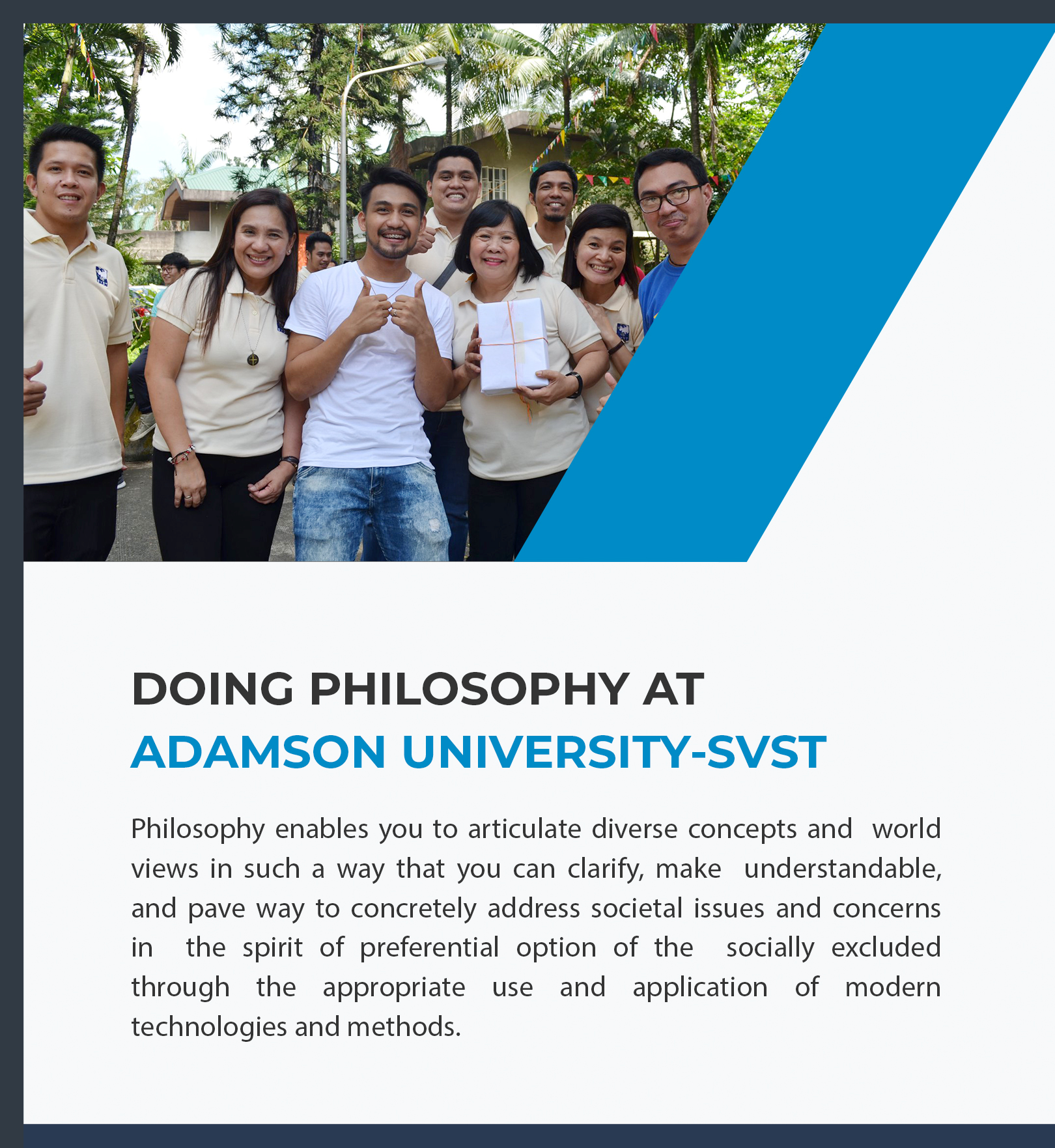
Philosophy for Theological Studies
This program in Philosophy is for seminarians or lay people who wish to acquire basic units in philosophy before proceeding to formal theological studies. It is a 2-year or 4-semester program with classes held once a week in a 3-hour meeting. Students are given the option to either follow the curriculum as it is presented or select particular courses based on their academic and formation needs.
Academic Prerequisites
An applicant must have graduated in any Bachelor's Degree (four-year university course) as specified by the commission on Higher Education in the Philippines or its equivalent in other countries.
Academic Course Load
First Year (21 Units)
First Semester
Introduction to Philosophical Studies
Logic
History of Western Philosophy 1
(History of Ancient and Medieval Philosophy)
Second Semester
Philosophical Anthropology/ Advance Philosophy of Man
Epistemology
Cosmology
(Philosophy of Nature )
Ethics
Second Year (30 units)
First Semester
Philosophy of Religion
Phenomenology
Hermeneutics/Philosophy of Language
History of Western Philosophy 2 (Modern and Contemporary Philosophy)
Metaphysics
Second Semester
Comparative Philosophy
History of Chinese Philosophy
Political Philosophy (Social Critical Theory)
Special Questions in Ethics
Philosophy of Science
Student’s shall finish within 2 years the 17 subjects offered on this course or finish the academic course load of a total of fifty one (51) Units of Philosophy as specified in the Philosophy for Theological Studies program.
SCHOLARSHIP AVAILABLE: https://www.svst.edu.ph/admissions#enrolling1
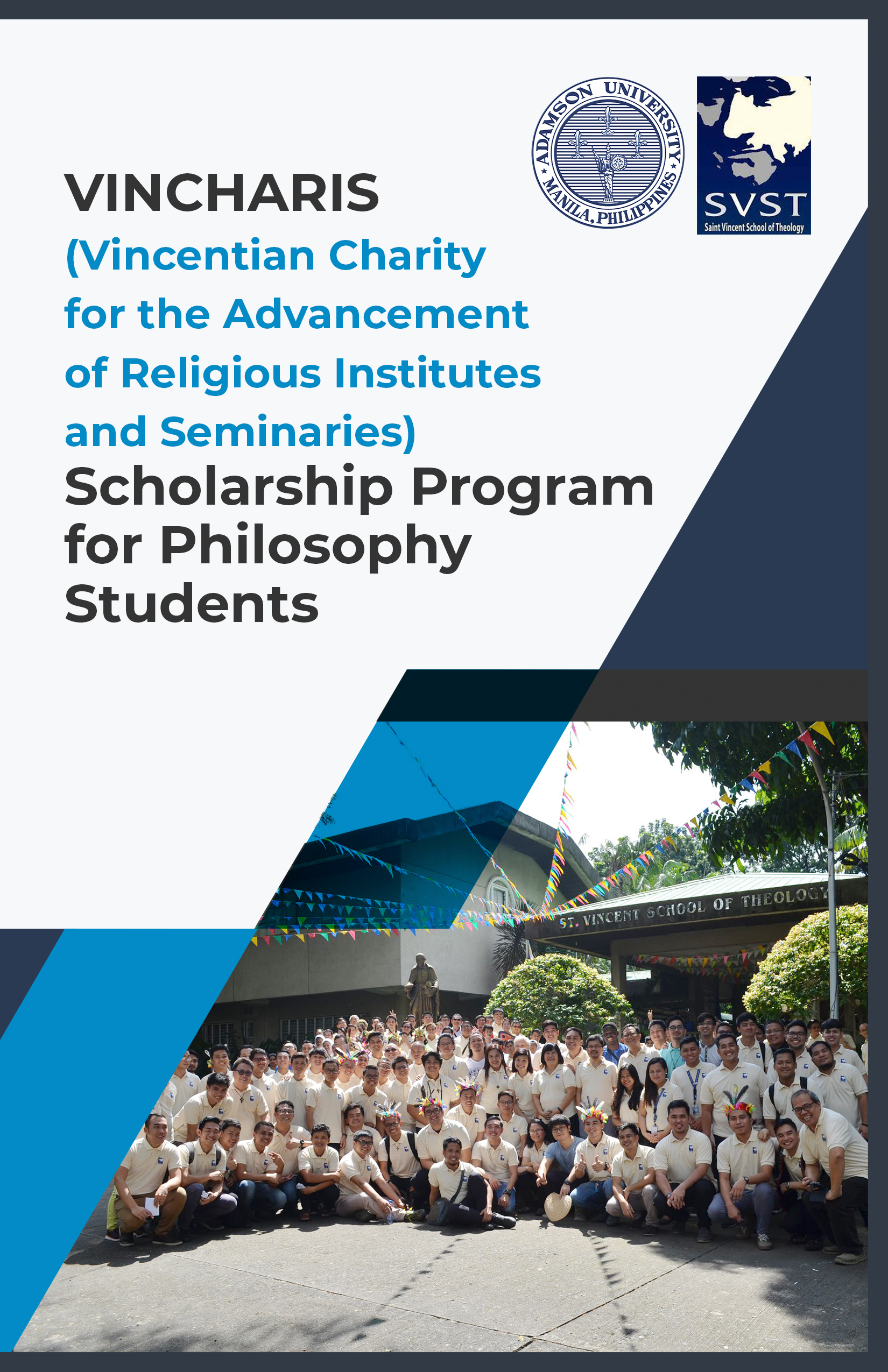
Christian Formation for Lay People
The general aim of Hapag-Layko or Handog na Pag-aaral sa mga Layko) is to form and train lay leaders so that they can effectively perform their responsibilities with the support of their ordained pastors. In practical terms, any lay person who participates in Hapag-Layko, therefore, seeks to equip the lay leader, theologically and pastorally, through a formation that is contextualized for the lay condition, involving lectures, workshops, and practical exercises, and focusing not only on the skilled but also on the vocation and spirituality of service of the laity.
Who are Qualified to Enroll for the Program
1. The Hapag-Layko Program is open to all lay people, 18 years of age and above.
2. There is no academic degree required to be able to register for this program, however, involvement in the pastoral life of his/her parish or other ecclessial movements will be of great help.
Scholarship
Hapag-Layko student scholars must be officially sent and supported by the Parish Priest. Application for scholarship must be done by the Parish Priest or his delegate through a formal written request. The letter contains the names of the participants, their current parish involvement and the program in which they will enroll. Endorsement letter from the Parish Priest must be given every semester during enrollment. This letter is sent to:
The Scholarship Committee of Hapag-Layko,
St. Vincent School of Theology,
221 Tandang Sora Avenue, 1116 Quezon City
It can also be e-mailed through svst_qc@yahoo.com
Priority is given to parishes with needed assistance and directed towards the building up of BECs, and whose Parish Priests are willing to support their leaders during and after the programs.
Other considerations:
1. Candidates for scholarship should be in a group of at least three (3) participants to be enrolled in the same program or module (no scholarship is given to an individual participant)
2. Candidates for scholarship must currently be handling specific responsibilities in their parish or small communities, or are chosen to take care of specific ministries after Hapag-Layko.
Coursework
General Theology Lecture Series
All participants in Hapag-Layko take this program before any specific formation. It is open to all kinds of lay leaders. The lecture series has 9 sessions, from August to December. They deal with various topics on the Christian faith, which are explained through the Bible and in a contemporary, relevant way. The topics are God’s Revelation; the human person; Jesus and the Kingdom of God; the Church: call to communion and sent to mission; Mary and discipleship; Christian moral living; and the sacraments.
After finishing the General Theology Lecture Series, participants will proceed to any of the three specific formation programs, according to their assigned responsibilities in their respective Christian communities.
Areas of Specialization:
The program has 4 teaching modules: each module runs for 9 class meetings.
Doing Theology of Everyday Life
Doing Theology on the Human Person
Doing Theology on Jesus for Filipinos
Doing Theology with Catholic Social Teaching
Course Pre-requisite:
Completion of General Theology Lecture Series
Four specific modules:
The Sacraments: History and Theology
Proclaiming the Word of God
Creative Liturgies and Rituals
Popular Devotions
Course Pre-requisite:
Completion of General Theology Lecture Series
These 4 modules are for those directly involved or will be involved in the organization, formation, and training of basic ecclesial communities (BECs). They can be BEC organizers, coordinators, core groups, or pastoral formation teams. Each of the 4 modules has 9 class meetings.
Four specific modules:
Basic Organizing Process
The Bible and the Christian Community
Managing and Sustaining BECs
Theology and Spirituality of BECs
Course Pre-requisite:
Completion of General Theology Lecture Series
Four specific modules:
General Introduction to Christian Spirituality
Lay Spirituality
Vincentian Spirituality
Marian Spirituality
Course Pre-requisite:
Completion of General Theology Lecture Series
Introductory Theological Formation (ITF)
The Introductory Theological Formation (ITF) is a one-year non-degree formation program designed for postulants and novices to religious life, youth leaders of parishes and schools, and others who wish to acquire basic knowledge on various aspects of the Christian faith that is responsive to the signs of the times.
This Certificate Program may be taken either for academic formation, personal enrichment, or as pre-requisite to the master's degree program (MA in Theology and Masters in Pastoral Ministry), and theological studies for the priesthood and religious life.
Classes are held on Mondays and Tuesdays , morning (9:00-12) and afternoon (1:30-4:30). Classs meetings are (3) hours per week for each course, with hourly short breaks.
Academic Prerequisites
There is no academic degree required to be able to register for this program. It is advisable, however, if the students has at least two years in college or university.
Since the ITF consists of inter-cultural and international students, it would help if the student has basic reading, writing, and communicating skills in the English language.
Course Work
First Semester
Theology: Reflection in Faith 3 Units
Christian Anthropology 3 Units
Introduction to the Bible 3 Units
Christology 3 Units
Second Semester
Christian Morality 3 Units
Church, Mary and Discipleship 3 Units
Liturgy and The Sacraments 3 Units
Introduction to Consecrated Life 3 Units
A student receives a “certificate of completion” at the end of two semesters.
1. Document Checking
• Submit all the required documents for admission to the Registrar.
• Get Registration Form from the information counter.
2. Filling in of Forms
• Proceed to the “Posting Area” to take note of the schedule and the courses being offered for your enrollment.
• Fill in all the data required in the Registration Form
3. Payment
• Pay the full or partial payment of the tuition fees at the Cashier's Office.
4. Advising and Encoding
• Proceed to the Registrar’s Office for approval and encoding of courses to be enrolled.
5. Assessment
• Get the Official Enrollment form and the Statement of Account of your tuition and other applicable school fees.
• Verify and counter-check all the data printed on your Official Enrollment Form.
6. ID Card Processing
• Fill out ID card forms
• Have your picture taken for the ID card.
Tel.: (+632) 8939-4361; (+632) 8930-9392
Tel./Fax: (+632) 3456-4028
Email: svst_qc@yahoo.com


